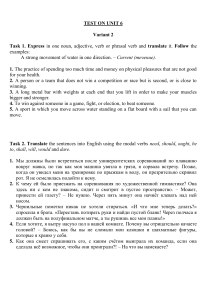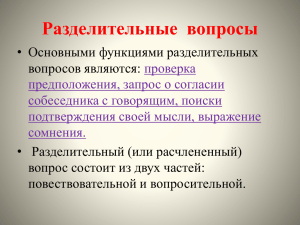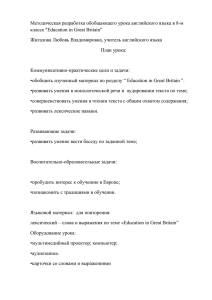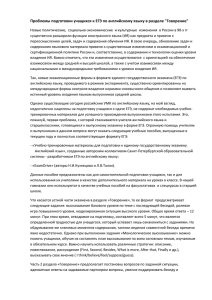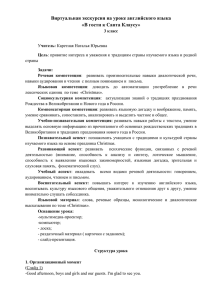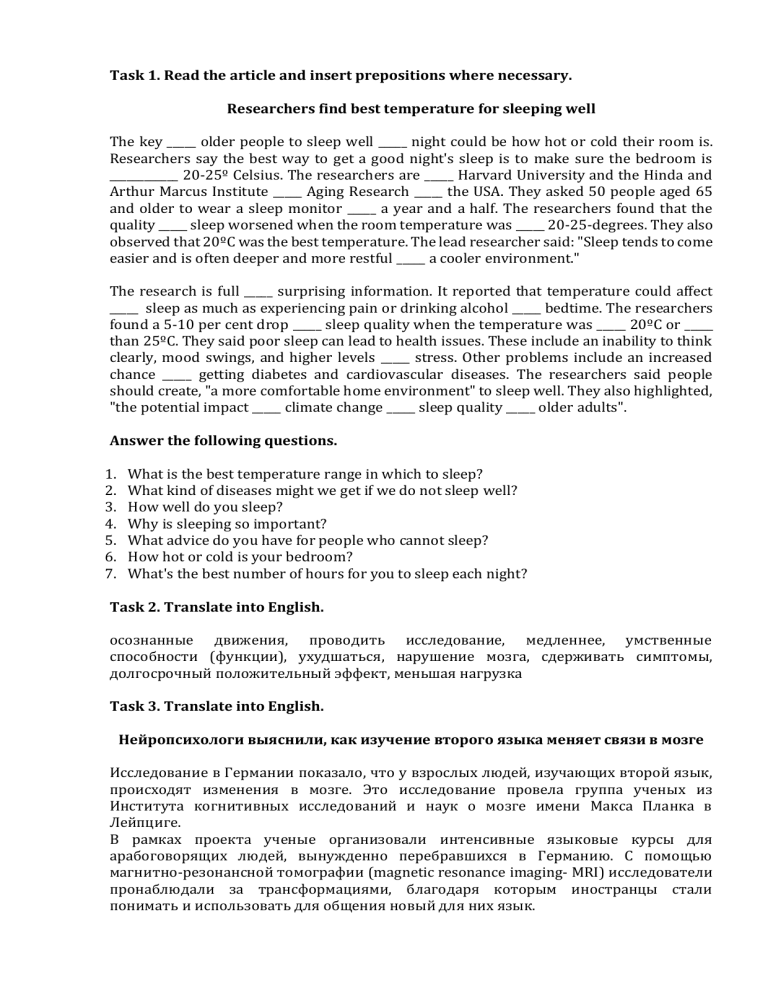
Task 1. Read the article and insert prepositions where necessary. Researchers find best temperature for sleeping well The key _____ older people to sleep well _____ night could be how hot or cold their room is. Researchers say the best way to get a good night's sleep is to make sure the bedroom is ____________ 20-25º Celsius. The researchers are _____ Harvard University and the Hinda and Arthur Marcus Institute _____ Aging Research _____ the USA. They asked 50 people aged 65 and older to wear a sleep monitor _____ a year and a half. The researchers found that the quality _____ sleep worsened when the room temperature was _____ 20-25-degrees. They also observed that 20ºC was the best temperature. The lead researcher said: "Sleep tends to come easier and is often deeper and more restful _____ a cooler environment." The research is full _____ surprising information. It reported that temperature could affect _____ sleep as much as experiencing pain or drinking alcohol _____ bedtime. The researchers found a 5-10 per cent drop _____ sleep quality when the temperature was _____ 20ºC or _____ than 25ºC. They said poor sleep can lead to health issues. These include an inability to think clearly, mood swings, and higher levels _____ stress. Other problems include an increased chance _____ getting diabetes and cardiovascular diseases. The researchers said people should create, "a more comfortable home environment" to sleep well. They also highlighted, "the potential impact _____ climate change _____ sleep quality _____ older adults". Answer the following questions. 1. 2. 3. 4. 5. 6. 7. What is the best temperature range in which to sleep? What kind of diseases might we get if we do not sleep well? How well do you sleep? Why is sleeping so important? What advice do you have for people who cannot sleep? How hot or cold is your bedroom? What's the best number of hours for you to sleep each night? Task 2. Translate into English. осознанные движения, проводить исследование, медленнее, умственные способности (функции), ухудшаться, нарушение мозга, сдерживать симптомы, долгосрочный положительный эффект, меньшая нагрузка Task 3. Translate into English. Нейропсихологи выяснили, как изучение второго языка меняет связи в мозге Исследование в Германии показало, что у взрослых людей, изучающих второй язык, происходят изменения в мозге. Это исследование провела группа ученых из Института когнитивных исследований и наук о мозге имени Макса Планка в Лейпциге. В рамках проекта ученые организовали интенсивные языковые курсы для арабоговорящих людей, вынужденно перебравшихся в Германию. С помощью магнитно-резонансной томографии (magnetic resonance imaging- MRI) исследователи пронаблюдали за трансформациями, благодаря которым иностранцы стали понимать и использовать для общения новый для них язык. Исследователи применили передовую методику МРТ-трактографии, позволяющую отследить ход и структурные изменения путей (pathways) головного мозга. В течение шести месяцев нейропсихологи изучали и методично сравнивали МРТ-снимки 59 арабоязычных участников, проходивших обследование в начале языкового интенсива, а также по прошествии трех и шести месяцев, то есть в середине и в конце курса. Анализ изображений показал усиление межнейронных (interneuronal) связей в языковой сети в белом веществе (White matter) мозга и вовлечение дополнительных областей в правом полушарии в процессе изучения второго языка. «Связи между языковыми зонами мозга в обоих полушариях увеличивались по мере прогресса в обучении. Узнавание новых слов укрепляло лексические и фонологические сети в обоих полушариях, особенно во второй половине программы обучения, на этапе закрепления (Consolidation)», — рассказал один из авторов работы Сюэху Вэй (Xuehu Wei). Интересно, что параллельно нейропсихологи обнаружили уменьшение связей между правой и левой половинами мозга, которые соединяет мозолистое тело (corpus callosum). По мнению исследователей, такое сокращение межполушарных связей говорит о том, что при изучении второго языка контроль левого полушария, где сосредоточена языковая функция, за правым ослабевает. Это высвобождает дополнительные ресурсы в правом полушарии для усвоения нового языка. Авторы отметили, что динамические изменения в связях мозга напрямую коррелировали с улучшением результатов в языковом тесте Института имени Гёте. В целом исследование показало, как мозг взрослого человека адаптируется к новым когнитивным потребностям за счет модуляции структурных связей внутри и между полушариями. Ученые подчеркнули, что новые данные помогли лучше понять, как люди овладевают языками и как при этом функционирует мозг. Task 4. Match the words and their definitions. 1. clutter 2. declutter 3. 4. 5. 6. 7. 8. digital mindfulness reduce essential consume hoarding a) important and necessary b) connected with the use of computer technology, especially the internet c) to make the price, amount, or size of something less or smaller d) to make a place tidy by removing things you do not want or need e) to use energy, goods, time, etc. f) a mental state achieved by concentrating on the present moment g) things that fill a space in an untidy way h) the act of collecting and keeping large amounts of food, money, etc., often secretly Task 5. Look at the pictures. Which one describes you better? Why do you prefer such a lifestyle? Task 6. Read the article and match the types of minimalism with their descriptions 1. 2. 3. 4. 5. : Experiential minimalism : Mindful minimalism : Digital minimalism : Essential minimalism : Visual minimalism Lifestyle: minimalism Minimalism is a lifestyle that has been gaining popularity in recent years. It involves reducing the amount of visual clutter and possessions in our lives to achieve mental clarity and a focus on what's essential. There are five types of minimalism: visual, digital, experiential, mindful, and essential. __________________ involves decluttering physical spaces, such as our homes and workplaces, to make them clean and simple. This type of minimalism is all about removing unnecessary items and focusing on what's truly important. __________________ is similar to the previous one, but it involves reducing our addiction to technology and social media to extend our attention span, increase productivity, and reduce stress levels. By minimizing the number of notifications, emails, and messages we receive, we can catch up with what's essential and avoid the constant need to consume information. __________________ involves paying more attention to how we spend our time and prioritizing activities that bring us joy and fulfillment. This type of minimalism is all about creating meaningful experiences in our lives. __________________ is about being present and aware of our thoughts, feelings, and surroundings. It involves practicing mindfulness techniques such as meditation and yoga to reduce stress and anxiety and increase mental clarity. By becoming more mindful, we can develop a deeper understanding of ourselves and our place in the world. __________________ is the most extreme form of minimalism and involves reducing our possessions to the bare essentials. This type of minimalism is often connected with hoarding disorder and is not recommended for everyone. In conclusion, minimalism is a lifestyle that can help us achieve self-awareness. Whether we choose to adopt any type of minimalism, the benefits are clear. By reducing the amount of clutter in our lives, we can create a more fulfilling and purposeful existence. Task 7. Match the types of minimalism with pictures. Discuss the questions: 1. Which type of minimalism is closer to you? 2. Which one would you like to try? Task 8. Complete the sentences with the given words consume clutter essential mindfulness digital reduce declutter 1. My room is full of ________________ , I need to clean it up. 2. We should ________________ less if we want to produce less garbage. 3. To ________________ my carbon footprint, I walk instead of driving short distances. 4. ________________ meditation helps me relax and focus on the present moment. 5. I prefer reading a physical book rather than a ________________ one. 6. Having a passport is ________________ if you want to travel abroad. 7. She decided to ________________ her closet and donate some clothes to charity. Task 9. Find the English equivalents in the article. набирающий популярность, визуальный беспорядок, для достижения ясности ума, снизить уровень стресса, техники осознанности, тревожность, перенять, сознательное существование Task 10. Translate into English. 1. Техники осознанности набирают популярность по мере того, как люди ищут способы достичь ясности ума и снизить уровень стресса в своей повседневной жизни. 2. В попытках осознанного существования люди осваивают техники осознанности, чтобы ориентироваться в визуальном беспорядке современного общества и обрести внутренний покой. 3. Набирающие популярность на рабочем месте методы осознанности доказали свою эффективность в снижении уровня стресса и повышении ясности ума у сотрудников. 6. Техники осознанности, такие как медитация и глубокое дыхание, набирают популярность как эффективные инструменты для снижения уровня стресса и борьбы с тревожностью. 7. В стремлении к целенаправленному существованию многие предпочитают применять техники осознанности, находя их полезными для преодоления сложностей современной жизни. 8. Осознавая связь между визуальным беспорядком и стрессом, люди обращаются к минимализму, чтобы добиться ясности ума. 9. Техники осознанности набирают популярность как целостный подход к преодолению тревожности, предлагая людям внедрять практические инструменты. Task 11. Open the brackets. 1. The spectators so (move) at the end of the film that everyone in the cinema (cry). 2. People often ignore the fact that air pollution (must, can, could, might) cause so many health problems. 3. The children spent all their money on computer games, so they (be to, have to, must, could) walk all the way back. 4. You (must, can, might) wear a life jacket when you go canoeing. 5. ... Young are usually impatient, but they should be more tolerant to ... old people, (a, the, ) 6. What musical instrument can you play? - I'm learning to play (a/an, the, —) violin. 7. ... Tango is not very popular with ... young people nowadays, (a, the, -) 8. My father usually travels by ... bus to ... work, (a, the, -) 9. We prefer to stay at (a/an, the, -) Ritz whenever we are in London. 10. When you arrive (in, to, at, for) England, you will be impressed (by, with, at) everything you will see there. 11. The teacher was pleased (at, with, to, by) the exam results. 12. The doctor warned me (of, in, about, with) the danger of eating too much fat food. 13. Lots of people care (for, about, in, of) elderly relatives. 14. We congratulated her (on, in, with, about) her success in her final exams. 15. Every day there is news of (another, the other, other, others) war breaking out somewhere in the world. 16. Can war actions ever be justified under (some, any, every, none) circumstances? 17. (Each, another, all, every) time I hear that music, it reminds me of you. 19. The situation is uncertain. (Nothing, anything, some, any) could happen. 20. I wanted to know if the prices (rise) again by the end of the year. 21. The secretary didn't know when the president (take) the final decision on this issue. 22. I'd like to know if the river (begin) to rise until some rain (fall). 23. We asked the manager if they (settle) the price problem by the end of the month. 24. He promised that he (phone) us as soon as he (arrive) home. 25. None of them knew when the results (announce). Everybody (wait) for it. 26. Where St. Paul's Cathedral (be situated)? 28. Try and (do) it right this time. - O.K. It's easy, as you (right, rightly) say. 29. My father is five years (old) than my mother but he looks (young) his age. 30. Why don't you get a cat? If you (keep) a cat, the mice (not, run) everywhere. 1. This time next month we (travel) around Africa, and we (return) home by the end of August. 2. Tina (buy) gifts for all her relatives before she (leave) (for, at, to) England. Yesterday she (come) to us to say goodbye. 3. More and more people (develop) health problems because of (-, a, the) air pollution. 4. When the train from Brussels (arrive)? - It (arrive) in 10 minutes at (-, a, the) Platform 7. 5. In 1301 after (defeat/defeating) the native Prince of Wales, King Edward I of England (name) his son "Prince of Wales". Since then (old) son of the king or queen of England traditionally (give) this title. 6. In 1536 Wales (bring) (into, in, to) the English system of national and local government by an Act of Union. 7. ... Welsh language is still very much a living force and (teach) side by side with ... English in schools of Wales, (a, the, -) 8. You asked John to fix you car, ...? - Yes, his advice (was, were) that I take it to the garage. 9. ...Young people (should, have to, can) respect ... elderly. ... life is often difficult for ... old people, (a, the, -) 10. After many attempts Terry (be able to, could, might) climb (to, at, by) the top of the mountain. 11. He (drive) a car (well, good) now, but two years ago he (could, might, must) ride only the bicycle. 12. Mrs Smith feels (bad, badly) today. She's by far (beautiful) woman I ever (see). 13. Was it a good party? - Yes, I (leave) far (late) I (intend) to. Task 12. Translate into English. (A) 1. Сказал ли преподаватель, что мы должны выучить этот текст наизусть? 2. Я не знал, что этот текст не надо учить наизусть. 3. Зря вы учили этот текст наизусть; его надо было просто читать. 4. Не шумите: дети, должно быть, спят. 5. Никто, наверное, не сказал ему об этом. 6. Они должны были прийти в 5, а уже 6 часов. 7. Они, наверно, збыли, что должны были прийти в 5 часов. 8. Надеюсь, вам не пришлось долго ждать, да? 9. Надеюсь, вам не придется долго ждать. 10. Эту книгу можно найти в любой библиотеке. 11. Стоит ли волноваться из-за таких пустяков? (B) 1. Однажды так случилось, что Джулия встретила Пола. 2. Ожидают, что девушка будет одета в зеленый пиджак и желтую юбку. 3. Оказалось, что Джейн переехала в новую квартиру. 4. Говорят, что Майк занял денег, но не особо беспокоился о том, чтобы их вернуть вовремя. 5. Оказалось, что роман написан довольно простым языком. 6. Он кажется взволнованным. Что произошло? 7. Они случайно не знают мистера Андерса? 8. Полагали, что письмо было утеряно. 9. Кажется, настроение моей сестры изменилось к худшему. 10. Полагают, что строительная компания заключила три больших и важных контракта. 11. Похоже, что завтра Джулия не придет вовремя. 12. Предполагается, что студенты нашего университета приходят вовремя на занятия. 13. Случилось, что в тот момент моего отца не было в городе. 14. Сообщается, что французские танцоры прибудут на следующей неделе. 15. Говорят, что мистер Смит хороший специалист в медицине. 16. Считается, что эти картины были написаны великим художником. 17. Этот фильм обязательно будет иметь большой успех. 18. Говорят, что Сью свободно говорит по-французски. (C) 1. Больной спросил врача, скоро ли он поправится. 2. Я не знаю, найдут ли они что-нибудь интересное в этом журнале. 3. Я хочу знать, ошибаемся ли мы или мы правы. 4. Профессор спросил студента, является ли английский его родным языком. 5. Преподаватель спросил меня, напомнил ли я всем студентам о том, что у нас завтра будет урок. 6. Я не могу вспомнить, оставил ли я свой ключ дома или потерял его где-нибудь. 7. Мы спросили профессора, сделает ли он операцию нашему товарищу немедленно. 8. Узнайте, пожалуйста, будет ли Семенов завтра вечером дома или пойдет навестить своих родителей. 9. Я не уверен, сказали ли эти люди правду. Task 13. Supply the correct form of the Subjunctive Mood of the verbs in brackets. 1. Oh, I wish I (not to send) him that letter. I'd give anything to take it back. 2. I wish I (to be) as sure as you. 3. But he wished that there (to be) some way in which he could help the young lawyer. 4. "I wish I (not to cry) so much," said Alice trying to find her way out. 5. And here I wish I (can) tell you half of the things Alice used to say. 6. I rather wished Poirot (to be) there. 7. I wish I (to know) it was your friend. 8. He wished he (to come) by air. 9. I wish I (to know) what to do now. 10.I wish that poor Strickland (to be) still alive. 11. I wish I (to know) it was your birthday, Lady Windermere, I would have covered the whole street in front of your house with flowers. 12. I wish they (to be) back. 13.1 wished I (to have) enough confidence so that I could transfer some to her. But I didn't. 14. I wish I never (to hear) of it. 15. I wish we (to have) bicycles. 16. I wish I (to know) where we are going. 17. I wish that I (to be) with the British. It would have been much simpler. Task 14. Use appropriate verb form after «I wish». 1. I wish I (to know) Spanish. 2. I wish I (not to drink) so much coffee in the evening: I could not Bleep half the night. 3. I wish you (to read) more in future. 4. I wish I never (to suggest) this idea. 5. I wish I (to be) at yesterday's party: it must have been very merry. 6. I wish we (to meet) again next summer. 7. Don't you wish you (to see) that performance before? 8. They wished they (not to see) this horrible scene again. 9. The unfortunate pupil wished he (not to forget) to learn the rule. 10. I wish I (to have) a season ticket to the theatre next winter. 11. I wish I (to consult) the teacher when I first felt that mathematics was too difficult for me. 12. I love sunny weather. I wish it (to be) warm and fine all the year round. 13.1 wish I (not to lend) Nick my watch: he has broken it. 14.1 wish you (to send) a word as soon as you arrive. 15.1 wish I (not to have) to do my homework every day. 16. I wish you (to go) skiing with me yesterday: I had such a good time! Task 15. Insert speak, say, tell, talk. 1. Listen to me, boys, do not ___! 2. My friend can ___ three foreign languages. 3. Yesterday we discussed our plans. Some of our workers ___ about the work of our factory. They ___ many interesting things about it. 4. Did you ___ to him about it? What did he ___ you? 5. On my day off I visited my friend. I ___ with his children. I asked them to ___ me about their studies. “We study well”, they ___. “Our marks are always good.” 6. We had some time ___ after dinner. My friend ___ me about his new work. 7. Did you show your report to the teacher? What did he ___ about it? 8. Let us ___ about the new film. Did you like the film? ___ us about it, please. 9. You ___ well, but there was a mistake in your last sentence ___ it again. 10. When my grandfather returned from Moscow, he often ___ us about his visit to the capital. He ___ us about the beautiful streets, green parks, fine theatres and buildings of Moscow. “Next year I shall go there again”, he ___.
